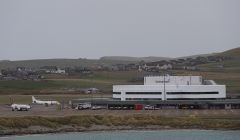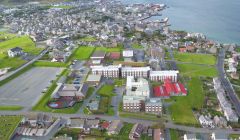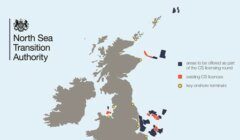Council / SIC falls short of emissions reduction target
SHETLAND Islands Council failed to meet a greenhouse gas emissions reduction target in 2023/24.
A report presented to councillors this week showed that annual emissions reduced by 4.33 per cent in 2023/24.
However, climate change strategy team leader Claire Ferguson said this fell short of the 7.79 per cent reduction target.
She also said some areas have exceeded targets, particularly transport – but this is largely down to changes to services following the Covid pandemic.
Ferguson said this has included reduced transport and commuting.
However, transport emissions are now beginning to rise again.
Ferguson told a meeting of the SIC’s environment and transport committee on Monday that “it’s important to recognise where these changes have been put in place” and what can be learnt from them.
She also said the SIC now needs to make “greater emissions reductions” – and that this will “require committed effort and investment in the short to medium term”.
As a result it is important for climate to be considered in investment prioritisation, the meeting heard.
An update report presented to councillors shows that the SIC’s greenhouse gas emissions in 2023/24 had reduced by nearly 3,000 tonnes.
Emissions from domestic buildings have reduced each year from 2019/20 to 2022/23, but increased over the last couple of years.
The report said the SIC’s housing stock is predominantly heated using electricity.
But Lerwick councillor Dennis Leask questioned a figure which said nearly 98 per cent of council housing stock is heated by “zero carbon energy sources”.
Ferguson clarified that electricity and district heating are deemed zero carbon services because the responsibility for emissions sits with the generators, and not the council itself.
Non-domestic building emissions reduced in 2020/21 due to the response to the Covid pandemic, which included buildings like schools not always being occupied, and figures have risen again.
Become a member of Shetland News
A covering report contains a number of recommended priority actions for 2024/25. A meeting of the full council next month will have the final sign-off on the recommended actions.
The recommendations include a review of the SIC’s data base relating to energy, emissions, efficiencies and climate change across the council.
Programmes of work should also set out the additional investment needed to make “effective change and emissions reductions”.
A fleet transition plan should also be developed, covering all vehicles, ferries, vessels and planes, as well as a housing energy efficiency strategy and plan.
It further recommends an estate decarbonisation plan, as well as more detailed understanding of how to reduce emissions through “infrastructure” such as the energy recovery plant, landfill, recycling, the Scord quarry and street lighting.
Committee chair Moraig Lyall questioned the focus on developing plans but infrastructure director John Smith said the climate change team “facilities and supports services to consider how they can build in climate change mitigation”.
This in turn should inform wider work, such as on inter-island transport connectivity and the school estate.
However North Isles councillor Robert Thomson said the SIC should adopt a “pragmatic approach” to tackling climate change.
“The cost of undertaking a lot of these climate change measures is very, very high and to be quite frank we just do not have the money locally to do it and I can’t see it coming from national bodies at the moment,” he said.
Thomson added that there are also challenges with technology.
He also said “the way to bring a community with you is to try to do the things that will provide a benefit to the people of Shetland more directly”.
However, Thomson said targets for zero per cent emissions by 2040 look “quite unrealistic” at the moment.
Meanwhile Green councillor Alex Armitage said he felt there was a misconception locally around climate change and encouraged the SIC’s communications department to do more on the matter.
He said people in Shetland often come with sarcastic comments about global warming when there is wintry weather.
“I think there’s a misconception in Shetland that climate change is all about heatwaves and things,” Armitage said, highlighting that Shetland’s highest recorded temperature was from back in 1910.
“It’s not actually heatwaves in Shetland but what we see here is a significant increase in wet and windy weather and I think that’s increased by about 30 per cent in the last 100 years or so,” he added.
Armitage said many of the changes needed are “behavioural ones” and suggested it was the SIC’s job to make it easier for people to make those decisions.
Dennis Leask, who chairs the SIC’s development committee, admitted the report could seem “quite scary” at first.
“I suspect as we move forward this is going to climb up our priorities,” he added.
“Maybe we need to be moving more quickly rather than waiting to see the devastation this could cause in our communities.”
In the closing remarks committee chair Moraig Lyall said her colleagues had already raised most of her points, with one of her priorities being on actions that will impact most on the community.
The report added a “Shetland grid electricity emissions factor” has been used for 2023/24, derived from Lerwick’s diesel-fired power station.
With the power station due to go into standby mode in 2026 as Shetland links into the national grid, the report said in the coming years the SIC will report electricity emissions using the “UK grid emissions factor”, so there should be a significant drop in emissions associated with grid electricity use.
“Once we start to report UK grid electricity emissions factor, we will see an annual drop in electricity emissions as the national grid decarbonises from the addition of renewable energy, with the pathway to be net zero by 2030.”
But the report highlighted how climate change is already impacting people and places in Shetland.
It referred to a “number of recent extreme weather events”.
“This will continue to intensify over the coming decades,” the report added.
“Taking early action to adapt will help to increase resilience and reduce risks and impacts of events.”
Become a member of Shetland News
Shetland News is asking its many readers to consider paying for membership to get additional features and services: -
- Remove non-local ads;
- Bookmark posts to read later;
- Exclusive curated weekly newsletter;
- Hide membership messages;
- Comments open for discussion.
If you appreciate what we do and feel strongly about impartial local journalism, then please become a member of Shetland News by either making a single payment, or setting up a monthly, quarterly or yearly subscription.













































































